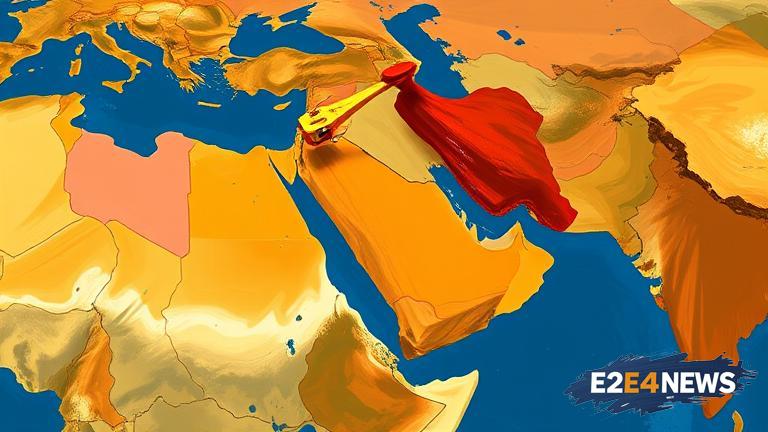The global economic landscape is undergoing a significant transformation, with the Middle East emerging as a key player in international trade. The region’s strategic location, coupled with its vast oil reserves and growing economies, has made it an attractive destination for foreign investors. Saudi Arabia, in particular, has been at the forefront of this shift, with the kingdom’s Vision 2030 plan aiming to diversify its economy and reduce its dependence on oil exports. The UAE, too, has been actively promoting itself as a business hub, with its world-class infrastructure and favorable business environment making it an ideal location for companies looking to expand into the Middle East. The region’s growing importance in global trade is also reflected in the increasing number of trade agreements being signed between Middle Eastern countries and other nations. For instance, the UAE has recently signed a comprehensive economic partnership agreement with India, which is expected to boost bilateral trade between the two countries. Similarly, Saudi Arabia has signed a number of trade agreements with countries like China and the US, further solidifying its position as a key player in global trade. The Middle East’s emergence as a major trade hub is also being driven by its growing logistics and transportation sector. The region is home to some of the world’s busiest ports, including the Port of Jebel Ali in Dubai and the Port of King Abdulaziz in Dammam, Saudi Arabia. These ports have become critical gateways for trade between Europe, Asia, and Africa, with many international shipping lines operating through them. The region’s airlines, too, have been expanding their operations, with carriers like Emirates and Qatar Airways offering direct flights to destinations all over the world. The growth of e-commerce in the Middle East has also been a key factor in the region’s emergence as a major trade hub. With a large and growing middle class, there is a increasing demand for online shopping, with many international retailers looking to tap into this market. The region’s governments have also been actively promoting e-commerce, with initiatives like the UAE’s Dubai CommerCity and Saudi Arabia’s Saudi E-commerce Council aiming to support the growth of the sector. Furthermore, the Middle East is also becoming a hub for financial services, with many international banks and financial institutions setting up operations in the region. The Dubai International Financial Centre, for example, has become a major hub for financial services, with many companies listing on its stock exchange. The region’s growing importance in global trade is also reflected in the increasing number of international events and conferences being held in the Middle East. The World Economic Forum, for instance, has held a number of events in the region, including the annual Middle East and North Africa meeting in Jordan. The region’s emergence as a major trade hub is also being driven by its growing tourism sector, with many countries in the region investing heavily in tourism infrastructure. The UAE, for example, has been actively promoting itself as a tourist destination, with its world-class hotels, restaurants, and entertainment options making it an attractive destination for visitors from all over the world. Saudi Arabia, too, has been investing in its tourism sector, with the kingdom’s Red Sea Development project aiming to create a new tourism hub on the Red Sea coast. The growth of the tourism sector in the Middle East is also being driven by the increasing number of visitors from countries like China and India, with many tourists drawn to the region’s rich history, culture, and natural beauty. In addition, the Middle East is also becoming a hub for innovation and technology, with many startups and entrepreneurs setting up operations in the region. The UAE, for example, has been actively promoting itself as a hub for startups, with initiatives like the Dubai Future District Fund aiming to support the growth of the sector. Saudi Arabia, too, has been investing in its technology sector, with the kingdom’s Saudi Technology Ventures fund aiming to support the growth of startups in the kingdom. Overall, the Middle East’s emergence as a key player in global trade is being driven by a combination of factors, including its strategic location, growing economies, and favorable business environment. As the region continues to grow and develop, it is likely to play an increasingly important role in international trade, with many countries looking to tap into its vast markets and growing consumer base.
